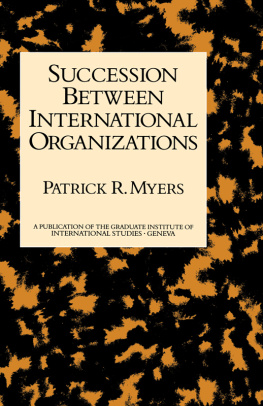SUCCESSION BETWEEN
INTERNATIONAL ORGANIZATIONS
A PUBLICATION OF THE GRADUATE INSTITUTE
OF INTERNATIONAL STUDIES,
GENEVA
Also published in this series:
The United States and the Politicization of the World Bank
Bartram S. Brown
World Financial Markets after 1992
Hans Genberg and Alexander K. Swoboda
Trade Negotiations in the OECD
David Blair
SUCCESSION BETWEEN INTERNATIONAL ORGANIZATIONS
Patrick R. Myers
First published in 1993 by
Kegan Paul International
This edition first published in 2011 by
Routledge
2 Park Square, Milton Park, Abingdon, Oxon, 0X14 4RN
Simultaneously published in the USA and Canada
by Routledge
711 Third Avenue, New York, NY 10017
Routledge is an imprint of the Taylor & Francis Group, an informa business
The Graduate Institute of International Studies 1993
All rights reserved. No part of this book may be reprinted or reproduced or
utilised in any form or by any electronic, mechanical, or other means, now
known or hereafter invented, including photocopying and recording, or in
any information storage or retrieval system, without permission in writing
from the publishers.
British Library Cataloguing in Publication Data
A catalogue record for this book is available from the British Library
ISBN 10: 0-7103-0457-9 (hbk)
ISBN 13: 978-0-7103-0457-5 (hbk)
Publishers Note
The publisher has gone to great lengths to ensure the quality of this reprint but points out that some imperfections in the original copies may be apparent. The publisher has made every effort to contact original copyright holders and would welcome correspondence from those they have been unable to trace.
For Lucretia
CONTENTS
Introduction
Succession between international organizations is a controversial topic. When the International Law Commission discussed adding the issue to its long-term program of work in 1971, it came to the conclusion that the scope for codification and progressive development of the law with regard to this matter would appear to be limited, and that consequently there was no need to consider the subject any further.
This statement is curiously at odds with the International Court of Justices 1971 advisory opinion on the Legal Consequences of the Continued Presence of South Africa in Namibia, where the Court flatly proclaimed the United Nations to be a successor to the League of Nations in respect of certain supervisory functions over the mandate for the territory of South West Africa.
Individual judges had no such scruples, and explicitly raised the issue of succession in their dissenting and separate opinions from the very first South West Africa case in 1950.
Some authors, on the other hand, were uncomfortable with the word succession and wrote about the supersession of and continuity in the law of international organizations.
What is it about the topic that provokes such diverse reactions? Is there really such a thing as succession between international organizations? Does it ressemble any other form of succession or is it something completely different?
The present study is an attempt to shed some light on this little-known area of international law. Although it is true that many of the situations that prompted discussions about succession between organizations occurred during the period immediately following the Second World War, a host of more recent events tend to indicate that the subject has more than historical interest. Moreover, it would appear that the proliferation of regional organizations and mounting pressures to rationalize international cooperation has given rise to more issues relating to succession of organizations in recent years than to state succession.
The widely divergent views related above suggest that the word succession, like most general legal concepts, carries several meanings. The first step will therefore be to define the notion and show how it can be applied to international organizations. It will then be possible to examine the factual situations where succession may have occurred. This will naturally lead to an inquiry of the legal basis of succession, and, finally, to a discussion of the effects of succession between international organizations.
I
The Definition of
Succession between
International
Organizations
A. Introduction
Succession is a concept that is found in all systems of law. An examination of private law succession and the doctrine of state succession reveals certain common traits that characterize all forms of succession. This chapter briefly reviews how the notion has developed in municipal law and international law, and draws on this experience to define what is meant by the expression succession between international organizations.
B. Succession in Municipal Law
Rights and obligations in municipal law are always the consequence of a person occupying a certain factual situation.
Legal doctrine sometimes distinguishes universalsuccession, the transfer of all of a persons rights and obligations, from partial succession, the transfer of specific rights and obligations. The concept of universal succession originated in primitive
In present day legal systems there are no perfect examples of universal succession.
Succession results either from an agreement between the predecessor and the successor or automatically by operation of the law when certain conditions are fulfilled. Conventional succession typically arises in consequence of a sale, gift, assignment, exchange or other such contractual arrangements. Examples of this type of succession are the inheritance (succession mortis causa) and bankruptcy.
In whatever manner succession occurs, the effect is always the same: the successor steps into the shoes of the predecessor and assumes the very same rights and obligations which the predecessor enjoyed.
Succession in municipal law, then, is a broad concept that is used in reference to any situation where there occurs at once a change of subjects and a continuation of a legal relationship. This continuity of rights and obligations is what sets succession apart from novation, a somewhat similar institution that
C. State Succession
The expression state succession is usually defined in terms of the replacement of one state by another in respect of sovereignty over a given territory.
This definition refers only to the factual situation of replacement. The legal consequences of a factual succession, that is the specific rights and obligations of the predecessor state which devolve to the successor state, are governed by a body of rules called the law of state succession.
Early writers on the subject of state succession drew their inspiration from Roman law. Grotius, Pufendorf, Vattel and other proponents of natural law regarded the successor state as a universal heir that continued the personality of the predecessor and received ipso jure all of its rights and obligations.
This doctrine of universal succession reached its appogee in the late nineteenth century in the works of Max Huber. The state, according to Huber, was a social organism that differed from the individual in that its constituent elements did not necessarily disappear upon death. Its people and territory continued to exist and passed as a single unit to the successor state with all of the rights and obligations attached to those elements.













